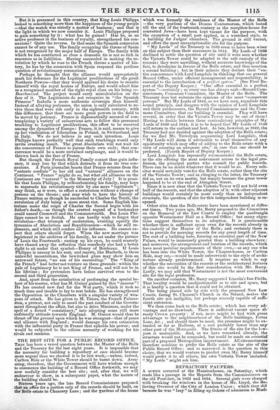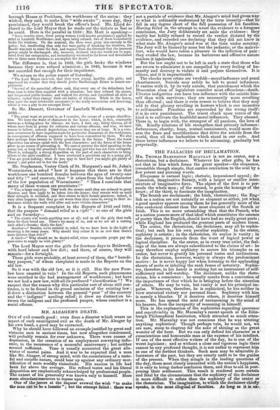REFRACTORY PAUPERS.
A soma occurred at the Mansionhouse, on Saturday, which reads like a passage in the Reports from the Commissioners on the old Poor-law, in 1833 and 1834. Several girls were charged with breaking the windows in the house of Mr. Lloyd, the Re-. lieving Overseer of the City of London Union ; which they did because he was " lazy" in filling up tickets of admission to Marl. borough House at Peckham, the workhouse of the union : they wished, they said, to make him "wide awake " ; some day, they proclaimed, they would break the officer's head. Mi. Lloyd de- dared to the Lord Mayor that he made out the tickets as fast as he could. Here is the parallel in 1833: Mr. Mott is speaking— "Some months since, three young women (well-known prostitutes) applied for relief at Lambeth Workhouse; and, upon being refused, two of them immediately broke the windows. On the moment, the three were given into custody to the police; but, recollecting that only two were guilty of breaking the windows, the Beadle was sent to state the fact, and request from the Overseer that the innocent person might be discharged: she, however, declared that she would not be sepa- rated from her companions, and immediately returned to the house and demolished two or three more windows to accomplish her desire."
The difference is, that in 1833, the girls broke the windows because they were refused admission ; in 1846, because it was not accorded fast enough for their impatience.
We return to the police report of Saturday.
"The Lord Mayor observed, that they were strong, healthy, able girls; and expressed his wonder that they should prefer Marlborough House to honest em- ployment. " Several of the parochial officers said, that every one of the defendants had from time to time been supplied with a situation; but they refused the places, and frequented public-houses, and walked the streets, and committed all sorts of villanies, rather than change their old habits of idleness. While in the house, they gave the most intolerable annoyance to the really necessitous and deserving, whom it was a pity to see amongst them."
So Mr. Drouett, Governor of Lambeth Workhouse, says, in 1833—
" Thegreat want at present is, as I conceive, the means of a proper classifica- tion. We have the worst of characters in the house; which, in fact, constantly serves as a hiding-place for thieves: we have, I dare say, thirty thieves, all of whom have been in prison for robberies and various offences, and who, we have reason to believe, commit depredations whenever they are at large. It is a com- mon occurrence to have inquiries made for particular characters at the workhouse, in consequence of offences supposed to have been committed by them. We also have perhaps from twenty to thirty prostitutes in the house. These the worst characters can always speak with the best characters; and the forms of the house allow us no means of preventing it. We canrot prevent the thief speaking to the young lad, or keep the prostitute from the young girl who has not been corrupted. There is, unhappily, a strong disposition on the part of such characters to bring others to the same condition. I have overheard a prostitute say to a young girl, 'Yon are good-looking; what do you stay in here for? you might get plenty of money'; and point out to her the mode."
Mr. Stephenson, Vestry Clerk of St. Margaret's and St. John's Westminster, is asked " how it happens that there are in that workhouse one hundred females between the ages of twenty-one and fifty ? " and answers, that " it arises from the bad character of the low population of Westminster." " Then I conclude that many of these women are prostitutes?"
" Yes; a large majority. They walk the streets until they are reduced to great distress, and then apply to be taken into the house: they remain with us until their strength is recruited, and then return to their former practices: indeed, it
in-
tercourse often happens that they go out worse than they came in, owing to their n- tercourse within the walls with older and more vicious characters."
It is a frequent complaint in the Reports of 1833 and 1834, that the paupers " demand relief as a right " : so one of the girls said on Saturday-- " The streets a'nt worth anything now at all; and so all the girls that walk them for their bread say. There's too many of us, and so we are all a cutting each other's throats; that's the fact."
Another—" Besides, were entitled to relief, for we have been in the habit of receiving it for many years. Why should they refuse it to us now that there's more distress than ever?"
A third—" Why should we be denied relief, when respectable people pay the poor-rates to supply us with plenty ?"
The Lord Mayor sent the girls for fourteen days to Bridewell, with hard labour and low diet ; and there, of course, they will remain—for a fortnight.
'These girls were probably, at least several of them, the "heredi- tary paupers," of whom complaint is made in the Reports on the old law.
So it was with the old law, so it is still. Has the new Poor- law been enacted in vain ? In the old Reports, such pluenomena were ascribed to the bad management of workhouses ; but have we not had a new law, with all its professed "classification " t We suspect that the reason why this particular sort of abuse still con- tinues, is to be found in the grand omission of the existing law : it drew a distinction between the general "poor" of the country and the " indigent" needing relief; it drew no distinction be- tween the indigent and the professed pauper, whose conduct is a social offence.



























 Previous page
Previous page